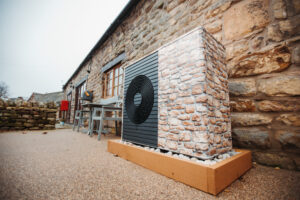Heat Pumps Explained – DESNZ talk to industry experts
3 April 2024

As we can see from MCS data, record numbers of consumers are choosing to install clean heating systems in their homes, especially heat pumps. Households can currently take advantage of a £7,500 grant contribution towards an air source or ground/water source heat pump via the Boiler Upgrade Scheme.
The Department of Energy Security and Net Zero (DESNZ) caught up with industry experts, including our Scheme Manager Alex Hughes, to ask important questions on heat pumps to help raise awareness amongst homeowners in choosing a heat pump to heat their homes.
About heat pumps
Heat pumps are highly efficient electric appliances that transfer and intensify heat from the outside air or ground into a building. They can produce around 3 units of heat for every unit of electricity they use. They significantly reduce a property’s energy demand when replacing technologies such as gas boilers.
The £7,500 Boiler Upgrade Scheme grant means some homeowners can now install a heat pump for less than the average cost of a gas boiler. It is one of the most generous heat pump installation schemes of its kind in Europe.
To help raise awareness around the actions homeowners can take to make their homes more energy efficient, more information can be found through the Welcome home to energy efficiency campaign.
Industry experts were asked some of the most common questions homeowners have about heat pumps:
How do I find an installer?
Alex Hughes, Scheme Manager at MCS, says:
MCS is a mark of quality which demonstrates adherence to industry-recognised standards for renewable products, contractors and their installations. Installers operating under the Boiler Upgrade Scheme must be MCS certified.
If you are considering a low-carbon installation for your home, community or small business – you can search for MCS certified installers that operate in your area using the Find a Contractor tool on the MCS website. Always look for the MCS logo for reassurance that your installer is certified.
How do heat pumps work?
Charlotte Lee, CEO at the Heat Pump Association, says:
Heat pumps capture heat from air, ground or water which is then passed through a heat exchanger. This is then absorbed by the refrigerant gas, raising the temperature, after which it is moved to a compressor, where pressure is applied to create a higher temperature. From here, it passes through another heat exchanger, where energy is transferred to the water that flows through your radiators or underfloor heating and to the water stored in your hot water cylinder.
How much do heat pumps cost?
Joanna O’Loan, Knowledge Manager at Energy Saving Trust, says:
Air source heat pumps are the most commonly installed in the UK. Including VAT, labour costs and the Boiler Upgrade Scheme grant, you could expect to pay around £6,500 to £11,500 depending on the work required. Some installers are now offering highly competitive installation costs, so it’s worth exploring your options. We’d recommend getting at least 3 installers to quote, so that you can compare costs and design.
Do heat pumps work in older homes?
Bean Beanland, Director for Growth at the Heat Pump Federation, says:
Yes. The challenge in older buildings is minimising heat loss (through insulation, where possible, but not an essential prerequisite) and having suitably sized heat emitters (radiators, underfloor heating and so on) but this challenge is not unique to heat pumps. The newest models of high temperature heat pumps make it easier to transition from fossil fuels to a heat pump.
You can read more on ‘heat pumps explained’ on the gov.uk website here, covering topics like heat pump noise, money savings and efficiency in colder weather.
